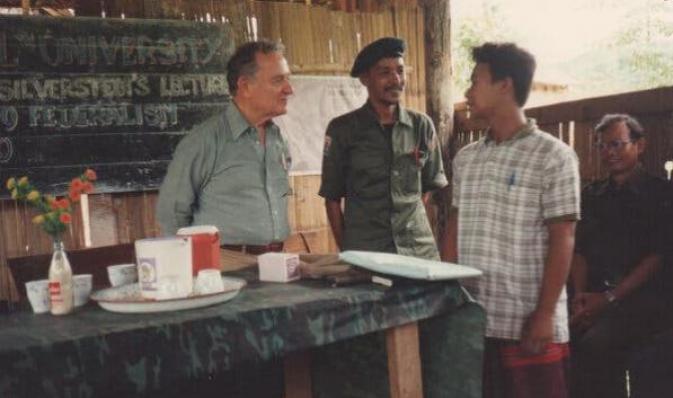

He focused on democracy and human rights in a strife-torn country both as an academic and as an on-the-ground adviser to rebel groups.
By Seth Mydans
July 20, 2021
Originally published here at the New York Times.
Josef Silverstein, a scholar and outspoken critic of Myanmar’s repressive military leaders over a turbulent half-century, died on June 29 at his home in Guilford, Conn. He was 99.
His son, Frank, said the cause was complications of dementia. His wife, Marilyn (Cooper) Silverstein, who was also his editor and collaborator, died eight days earlier.
Professor Silverstein, who taught international relations and Southeast Asian studies at Rutgers University in New Jersey, focused on democracy and human rights in Myanmar both as an academic expert and as an on-the-ground adviser to opposition groups.
Because of his criticism of the military leadership, he was denied entry to Myanmar for most of his career. As a result he frequently met with rebel leaders along the borders with Thailand and China, advising them on the concepts of federalism and constitutional law.
Professor Silverstein “was no run-of-the-mill Western expert or academic,” Maung Zarni, a Burmese educator, academic and human rights activist, wrote in an appreciationpublished online this month. Rather, he said, the professor was part of a breed of international scholars who “chose to forego access to the countries and peoples they studied — and cared about — as they endured under murderous military dictatorships.”
After a coup in 1962, when the military, led by Gen. Ne Win, replaced the civilian government, Myanmar, then known as Burma, shut itself off from the outside world to pursue what Ne Win called a “Burmese way to socialism.” Many, including Professor Silverstein, found the policy to be economically disastrous.
“Josef Silverstein was one of the few Western academics who really knew and spoke out about what was going on in Myanmar and the terrible toll the military continued to inflict,” Phil Robertson, the deputy director of the Asia division of Human Rights Watch, wrote in an email. “For that, he earned admirers among the Burmese people and their advocates around the world, and the deep hatred of the country’s military dictators.”
His insights helped keep many journalists on track through the twists and turns of Myanmar’s turmoil, including the military massacres of protesters in 1988 and the more recent slaughter of Rohingya Muslims.
“When we, at The Associated Press, were pressed for some intelligent, insightful comment on developments in Burma, someone in our bureau would say, ‘Let’s contact Josef,’” Denis Gray, the news agency’s longtime Bangkok bureau chief, wrote in an email. “And he always came through.”
On Feb. 1, a military coup ended a period of quasi-democracy in Myanmar that began in 2011, when parliamentary elections and other reforms were introduced. And the military’s bloody crackdown on pro-democracy protesters has continued.
“I know how devastated he would be knowing of the events which have taken place since Feb. 1,” Mr. Gray said of Professor Silverstein. “He was always looking forward to the day of real democracy for Burma.”
In March 2013, after the pro-democracy leader Daw Aung San Suu Kyi was released from two decades of house arrest, Professor Silverstein was prescient in warning about the political compromises she might make.
“To the outside world, nothing has really changed with her; she is Suu Kyi and all the beautiful things that go with it,” he told The New York Times. “She is essentially making herself irrelevant. We have not heard Suu Kyi talk as Suu Kyi.”
Since then Mrs. Aung San Suu Kyi has disappointed her supporters abroad, particularly by failing to speak out against the military massacres of the Rohingya minority.
Josef Silverstein was born in Los Angeles on May 15, 1922, the middle child of Frank and Betty (Heymanson) Silverstein. His father ran an Army-Navy store in Hollywood, and his mother was a sales associate at Bullock’s department store in Los Angeles.
Professor Silverstein spent much of World War II and the Korean War at sea with the merchant marine, signing on after Pearl Harbor and serving in the Atlantic, Pacific and Middle East war zones.
In 1952, he earned a bachelor’s degree at the University of California at Los Angeles, where he was elected to Phi Beta Kappa. He went on to pursue a Ph.D. in political science in the Southeast Asia studies program at Cornell University.
His introduction to the country that would consume his life came in 1955, when he received a Fulbright Scholarship to travel to Rangoon, the capital (now Yangon), and complete his research for his doctorate, which he received with honors in 1960.
His first academic appointment was to Wesleyan University in Connecticut, where he taught political science from 1958 to 1964. He then moved to Rutgers, where he was on the faculty until he retired and became a professor emeritus in 1992.
He took leaves of absence to be a Fulbright lecturer at Mandalay University in Burma in 1961 and at the University of Malaya in Malaysia in 1967. In 1970, he took a two-year leave to serve as director of the Institute of Southeast Asian Studies in Singapore.
Professor Silverstein’s publications include the books “The Political Legacy of Aung San” (1972), “Burmese Politics: The Dilemma of National Unity” (1980) and “Burma: Military Rule and the Politics of Stagnation” (1977).
In addition to his son, Professor Silverstein is survived by another son, Gordon, and a granddaughter.
Seth Mydans reported as a foreign and national correspondent for The New York Times and its sister publication, The International Herald Tribune, from 1983 to 2012. He continues to contribute to The Times.
A version of this article appears in print on July 21, 2021, Section A, Page 21 of the New York edition with the headline: Josef Silverstein, 99, Scholar of Myanmar and an Adviser to Its Opposition Groups.









